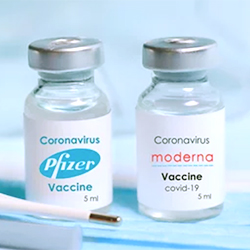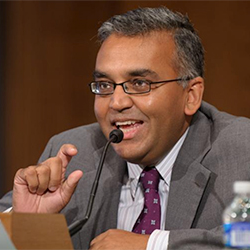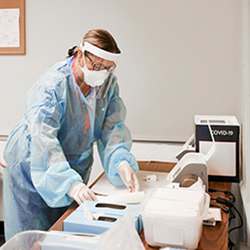By Marie Rosenthal, MS
Despite a number of countries, including the United States, relaxing their mitigation efforts, the WHO said cases started to inch back up after two months of steady declines. President Joe Biden pleaded with Congress to continue to fund COVID-19 emergency efforts. Pfizer-BioNTech and Moderna asked the FDA to expand their emergency use authorizations for another booster for older adults. Mr. Biden appointed Ashish Jha, MD, MPH, to replace Jeff Zients as the White House COVID-19 response coordinator. Although he praised Mr. Zients, he gave no reason why he was being replaced. And finally, the FDA recalls two COVID-19 tests.
It’s Not Over
After a consistent decrease in the number of new COVID-19 cases reported weekly throughout the world since the end of January, the number is starting to inch up again, according to the World Health Organization.
The WHO reported that during the week of March 7-13, the number of new weekly cases increased by 8% compared with the previous week. Across the six WHO regions, more than 11 million new cases and just over 43,000 new deaths were reported. As of March 13, more than 455 million confirmed cases and over 6 million deaths have been reported globally.
“Although reported [COVID-19] cases and deaths are declining globally, and several countries have lifted restrictions, the pandemic is far from over, and it will not be over ‘anywhere’ until it’s over ‘everywhere,’” said Tedros Adhanom Ghebreyesus, MS, PhD, the director-general of the WHO.
At the regional level, the Western Pacific, African and European regions reported an increase in new weekly cases of 29%, 12% and 2%, respectively, compared with the previous week; while a decrease has been reported by the Eastern Mediterranean Region (–24%), South-East Asia Region (–21%) and Region of the Americas (–20%).
The number of new weekly deaths increased in the Eastern Mediterranean Region (38%), Western Pacific Region (27%), African Region (14%) and Region of the Americas (5%), while it remained similar to that of the previous week in the European Region and decreased in the South-East Asia Region (9%).
President Joe Biden reminded Congress that the pandemic is not over, after it refused to approve the $22.5 billion in additional emergency funding to fight the pandemic in the United States. In a March 15 statement, the president reminded Congress about all the progress the United States has made: free and widely available access to vaccines, boosters, treatments, tests and masks.
“As we enter a new moment in the pandemic, Congress has not provided us with the funding we need to continue the COVID-19 response and minimize the pandemic’s impact to the nation and our economy,” Mr. Biden said. “With cases rising abroad, scientific and medical experts have been clear that in the next couple of months there could be increasing cases of COVID-19 here in the U.S. as well. As the administration has warned, failure to fund these efforts now will have severe consequences as we will not be equipped to deal with a future surge. Waiting to provide funding once we’re in a surge will be too late.”
Consequences of a lack of funding include:
- an inability to obtain sufficient booster doses and variant-specific vaccines, if needed, or accelerate the creation of next-generation vaccines;
- providers no longer being able to submit claims for testing, treating and vaccinating the uninsured;
- a diminished supply of monoclonal antibody treatments by May;
- a halt of critical efforts to test and provide vaccine and treatments, including oral antivirals;
- reduced commitment to prepurchase of new promising treatments; and
- reduced ability to rapidly identify emerging variants.
“Inaction will set us back in this fight, leave us less prepared, and cost us more lives,” the president said.
Pfizer-BioNTech and Moderna Seek EUA for Additional Booster
Both Pfizer-BioNTech and Moderna petitioned the FDA to approve an additional booster dose of their messenger RNA (mRNA) vaccines against COVID-19 due to waning immunity.

Pfizer-BioNTech asked for an additional booster dose for adults 65 years of age and older who have received an initial booster of any of the authorized or approved COVID-19 vaccines, while Moderna asked for boosters for adults 18 years of age and older.
The Pfizer-BioNTech submission is based on two real-world data sets from Israel analyzed at a time when the omicron variant was widely circulating. These data showed evidence that an additional mRNA booster increases immunogenicity and lowers rates of confirmed infections and severe illness.
An analysis of Israeli Ministry of Health records was conducted for more than 1.1 million adults 60 years of age and older who had no known history of SARS-CoV-2 infection and were eligible for a second booster, which means they received four doses (medRxiv 2022:2022.02.01.22270232. doi:10.1101/2022.02.01.22270232). These data showed rates of confirmed infections were two times lower and rates of severe illness were four times lower among individuals who received an additional booster dose of the Pfizer-BioNTech COVID-19 vaccine administered at least four months after an initial booster (third) dose, compared with those who received only one booster dose.
Also included in the submission are results from an ongoing, open-label, nonrandomized clinical trial in healthcare workers 18 years of age and older at a single study center in Israel who had been vaccinated with three doses of the Pfizer-BioNTech COVID-19 vaccine. Among the 154 (out of 700) participants who received an additional booster (fourth) dose of the Pfizer-BioNTech COVID-19 vaccine at least four months after the initial booster, neutralizing antibody titers increased approximately seven- to eightfold at two and three weeks after the additional booster (fourth) dose, compared with five months after the initial booster (third) dose. Additionally, there was an eight- and 10-fold increase in neutralizing antibody titers against the omicron variant (B.1.1.529) at one and two weeks after the additional booster dose, respectively, compared with five months after the initial booster. The study also revealed no new safety concerns in individuals who received an additional booster dose of the vaccine.
Emerging evidence, including data from Kaiser Permanente Southern California (KPSC), suggests that effectiveness against both symptomatic COVID-19 and severe disease caused by omicron wanes three to six months after receipt of an initial booster (N Engl J Med 2022 Mar 2. doi:10.1056/NEJMoa2119451). Thus, additional booster doses may be needed to ensure individuals remain adequately protected, Pfizer said. The data being reviewed by the FDA from Israel suggest that an additional booster dose of the Pfizer-BioNTech COVID-19 vaccine administered at least four months after an initial booster dose could restore antibody titers to peak post–third-dose titer levels, improve protection against infection and severe disease in individuals 60 years of age and older in Israel, and have a similar safety profile to that of previous doses. The data from KPSC were provided to the FDA as an example of waning of the Pfizer-BioNTech COVID-19 vaccine, but have not been reviewed by the agency.
The request to include adults over 18 years of age was made to give the CDC flexibility in determining who should receive an additional booster dose, according to Moderna.
The company said its submission request was also based on Israeli data and other information about waning immunity in the face of omicron. The company said its clinical trials for an omicron-specific booster (mRNA-1273.529) and a bivalent omicron-specific booster (mRNA-1273.214) are ongoing.
Biden Appoints New Leader for the COVID-19 Response
Mr. Biden appointed Ashish Jha, MD, MPH, the dean of Brown University’s School of Public Health, in Providence, R.I., as the new White House COVID-19 response coordinator.

“Dr. Jha is one of the leading public health experts in America, and a well-known figure to many Americans from his wise and calming public presence,” Mr. Biden said in a statement. “As we enter a new moment in the pandemic—executing on my National COVID-19 Preparedness Plan and managing the ongoing risks from COVID—Dr. Jha is the perfect person for the job.”
He replaces Jeff Zients, who has led the response since Mr. Biden took office. The statement did not say why Mr. Zients was replaced, although it praised his work on the response team.
“Jeff spent the last 14 months working tirelessly to help combat COVID. He is a man of service and an expert manager. I will miss his counsel and I’m grateful for his service,” Mr. Biden said.
“COVID-19 is the greatest public health crisis we’ve faced in my lifetime, and it required the country to build from scratch an emergency response infrastructure that could quickly and equitably get people life-saving protections. Jeff put his decades of management experience to work formulating and executing on a plan to build the infrastructure we needed to deliver vaccines, tests, treatment, and masks to hundreds of millions of Americans.
“When Jeff took this job, less than 1% of Americans were fully vaccinated; fewer than half our schools were open; and unlike much of the developed world, America lacked any at-home COVID tests. Today, almost 80% of adults are fully vaccinated; over 100 million are boosted; virtually every school is open; and hundreds of millions of at-home tests are distributed every month. In addition, the US leads the global effort to fight COVID, delivering more free vaccines to other countries than every other nation on Earth. The progress that he and his team have made is stunning and even more important consequential. Lives have been saved.”
Mr. Zients and his deputy, Natalie Quillian, will leave the response team in April.
FDA Recalls 2 Home COVID-19 Tests
The FDA recalled two COVID-19 tests; both recalls are class I recalls, the most serious type of recall, according to the FDA.

The FDA recalled 45,000 Celltrion DiaTrust COVID-19 Ag Rapid Tests, because they provide false-positive test results.
The Celltrion DiaTrust COVID-19 test is intended to detect the presence of SARS-CoV-2, based on a nasopharyngeal swab sample from patients, which are collected by healthcare providers.
A false-positive antigen test result may lead to a delay in both the correct diagnosis and treatment for the actual cause of a person’s illness. False-positive results also could lead to more spread of the SARS-CoV-2 virus if presumed positive people are housed together.
In addition, the tests’ labeling for the affected products includes a shelf life of 18 months. However, the FDA’s emergency use authorization specifies these tests may only be used for 12 months.
Although there have been no reports of injuries, adverse health consequences or death associated with the use of the affected products, false-positive or false-negative results from improper use of these tests could lead to further exposure of uninfected individuals to the SARS-CoV-2 virus. There are also serious injury risks if someone who is not trained to collect a nasopharyngeal swab sample attempts to do so.
Healthcare workers should discontinue using these tests and return them to the company, according to the FDA. For more information, email CelltrionUSA@celltrion.com.
The FDA also recalled about 397,700 SD Biosensor Recalls STANDARD Q COVID-19 Ag Home Tests, which use a nasal swab sample to detect antigens from SARS-CoV-2. This test is neither authorized, cleared nor approved by the FDA for marketing or distribution in the United States. (This recall does not apply to the SD Biosensor COVID-19 At-Home Test, which was authorized by the FDA on Dec. 24, 2021, and is distributed by Roche Diagnostics.)
SD Biosensor Inc. is recalling its Standard Q COVID-19 Ag Home Tests because these tests were distributed to U.S. customers without authorization, clearance or approval from the FDA.
There are insufficient data demonstrating that the test’s performance is accurate. This means there is a risk for false-negative and false-positive test results.
There have been no reports of injuries, adverse health consequences or death associated with the use of the SD Biosensor Standard Q COVID-19 Ag Home Tests.
For more information, call (714) 202-5789 or email info@lkconsultinggroup.com.
{RELATED-HORIZONTAL}
